Kubla Khan Poem Summary And Analysis
Background on the Poem and Its Author:
Samuel Taylor Coleridge composed the poem "Kubla Khan" in 1797. Coleridge, a well-known English poet and philosopher, is regarded as one of the ancestors of the Romantic literary movement. He is renowned for using strong imagery and supernatural themes in his poetry.
Writing "Kubla Khan" during a period of prolific creation for Coleridge coincided with his experimentation with opium, which he said enabled him to reach a higher plane of consciousness. According to legend, Coleridge's opium-induced dream of seeing the majestic palace of Kubla Khan and its surroundings inspired the poem.
The poem wasn't released until 1816 when it was included in the Coleridge collection "Christabel, Kubla Khan, and the Pains of Sleep." "Kubla Khan" is regarded as one of Coleridge's greatest works and has considerably influenced the canon of literature despite its brief duration.
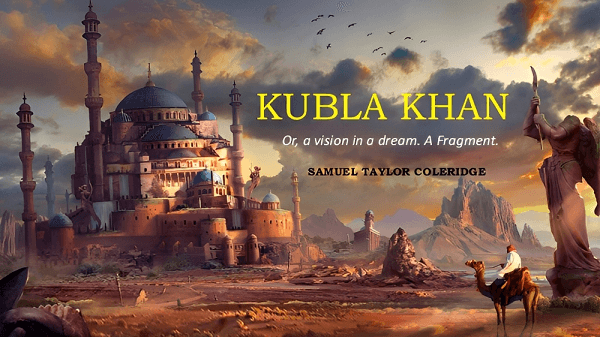
Exploring Imagination, Nature, and the Supernatural:
Romantic poetry's "Kubla Khan" is a masterwork that explores themes of fantasy, nature, and the paranormal. Coleridge conjures a surreal world with vivid imagery and symbolic language that transports the reader to Kubla Khan's castle and the surroundings. By examining these themes, Coleridge demonstrates the ability of imagination to conjure new realities and experiences, the magnificence and awe-inspiring features of nature, and the enigmatic and otherworldly facets of the supernatural. Overall, "Kubla Khan" is a strong and timeless masterpiece whose imaginative and mystical elements continue to enthral and inspire readers.
The Plot and Characters:
Since "Kubla Khan" is a lyrical poem that concentrates more on creating a vivid and surreal setting than conveying a story, it lacks a standard storyline and cast of characters. A description of Kubla Khan's palace, a legendary Mongol monarch who controlled China in the 13th century, opens the poem. The palace is said to have been constructed in a stunning and exotic setting bordered by gardens, woodlands, and rivers. Coleridge uses vivid, rich imagery to convey the splendour and grandeur of the palace.
A "savage place" that is both lovely and deadly is described in the second half of the poem as the area around the palace. With allusions to great rivers, holy springs, and old forests, Coleridge employs images to convey a feeling of the strength and charisma of nature in this passage. The speaker entertains thoughts of erecting a pleasure dome in this setting, but the poem stops suddenly before this notion is completely developed.
Overall, "Kubla Khan" focuses more on evoking wonder and imagination through vivid imagery and magical themes than developing the plot or characters.
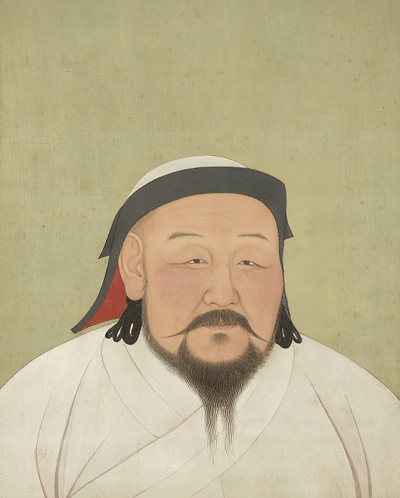
Analysis of The Structure and Language:
The book "Kubla Khan's structure and language are essential to its full and vivid images. The poem's vivid and sensual descriptions inspire astonishment and wonder in the reader. It is written dreamily and poetically. Coleridge used poetic devices, such as alliteration, repetition, and elaborate metaphors, to accomplish this impact.
The poem's two distinct halves, which contrast with one another and highlight the tension between man's ambition and nature's power, are also significant. The abrupt ending of the poem suggests that the speaker needs help to realize their goals fully.
The Poem's Themes:
- Imagination: As seen by the speaker's depiction of Kubla Khan's palace and the surrounding area, the poem honours the capacity of the mind to conjure up new realities and experiences.
- Nature: The poem examines how nature can be seductive and dangerous and how beautiful and awe-inspiring it is. Coleridge evokes the majesty of nature by using pictures of healthy rivers, old woods, and holy springs.
- The Supernatural: The poem references the supernatural, including the "damsel with a dulcimer" who sings of the mythical Mount Abora. This suggests a supernatural and magical component to the natural world.
- Ambition: The poem advances the claim that human ambition is restricted by the power of nature, as evidenced by the speaker's failure to completely realize his vision of a pleasure dome in the natural landscape.
- Creativity: The poem honours the artistic process and its part in giving life to fresh concepts and thoughts.
In general, "Kubla Khan" examines the connection between human imagination, natural phenomena, and the paranormal, emphasizing the capacity of the mind to conjure up new realities and experiences and the stunning and awe-inspiring features of the natural world.
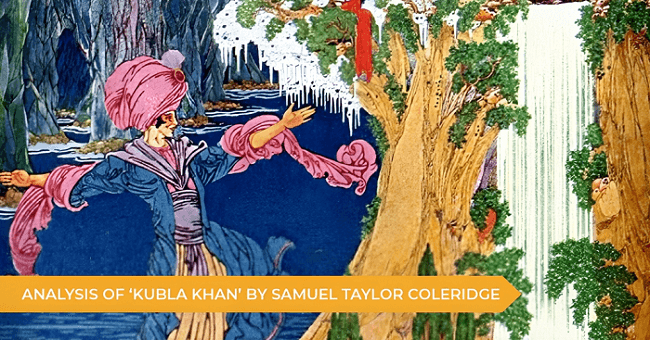
Coleridge's Use of Imagery and Symbolism:
- Imagery: Coleridge's use of vivid and rich imagery produces a sense of immersion in the surreal world of the poem. His sensory-dense descriptions of the palace of Kubla Khan and the surrounding area paint the reader a realistic picture in their minds.
- Symbolism: Coleridge employs a variety of symbols to imply deeper meanings throughout the poem. As an illustration, the "sunless sea" and the "caverns measureless to man" reflect the scope and mystery of the natural world, respectively. At the same time, the "pleasure dome" stands for human aspiration and the desire to build something enormous and great.
- Allusion: The poem gains depth and complexity from Coleridge's use of allusion, particularly to the biblical tale of Eden and the Mount Olympus myth. These references imply that the natural world possesses a divine or legendary essence that defies human comprehension.
- Contrast: The contrast between light and dark, artificial and natural, and beauty and danger is used in the poem to build tension and complexity in the imagery. For instance, the contrast between the lavish palace and the wild terrain symbolizes a conflict between human ambition and the might of nature.
Overall, Coleridge's symbolism and imagery in "Kubla Khan" conjures up a rich, vivid, lovely, and evocative universe, luring readers to delve further into the poem's complexity.
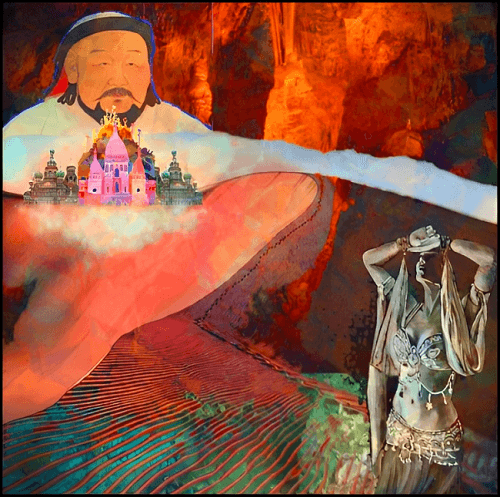
The Poem's Historical and Cultural Context:
- Orientalism: The poem captures the Romantic period's pervasive interest in the exotic and the "other" in European society. The image of the "Orient" as a place of mystery and beauty permeates Coleridge's picture of Kubla Khan's palace and the surrounding environment.
- Nature & the Sublime: The poem also illustrates the Romantic fascination with nature's sublime and majesty. The reader should feel awe and astonishment while reading Coleridge's depictions of the natural world, which stress its majesty and force.
- Opium Addiction: The opium addiction that Coleridge battled throughout his life may have impacted the poem's surreal character. Certain critics have put forth the idea that "Kubla Khan" was influenced by an opium-induced hallucination. However, there is little hard proof to back this claim.
- Literary Tradition: Coleridge's interest in literature, notably the writings of William Shakespeare and John Milton, is evident in the poem. These authors and the Gothic and Romantic literary trends of the day impacted Coleridge's use of allusion and symbolism.
Overall, the historical and cultural setting of "Kubla Khan" is firmly entrenched in the Romantic era, reflecting the time's infatuation with the exotic and enigmatic and its interest in the sublime and the power of nature. Coleridge's opium addiction and his interest in literary tradition are reflected in the poem and other aspects of his personal life.
Influence on Romantic Poetry:
- "Kubla Khan" is recognized as one of the best pieces of Romantic poetry, and other Romantic poets like William Wordsworth and Percy Bysshe Shelley have drawn inspiration from it.
- The poem's celebration of the beauty of nature and the power of imagination became major themes in Romantic poetry and affected the growth of the Romantic movement.
- Coleridge pushed the limits of what was appropriate in poetry by utilizing vivid imagery and symbolism and experimenting with form and structure.
- The poem's surrealistic feel, which many critics credit to Coleridge's opium addiction, came to be recognized as a defining characteristic of Romantic poetry and impacted the rise of the Surrealist movement in the 20th century.
Influence on Literature as a Whole:
- "Kubla Khan" has left a lasting impression on literature as a whole, prompting innumerable authors and creatives to investigate the topics of imagination, nature, and the paranormal.
- Numerous literary works, ranging from the Gothic novels of the 19th century through the modernist poetry of T.S. Eliot and Ezra Pound, show the poem's impact.
- The poem's use of vivid imagery and praise of the creative process has inspired authors of works in every genre, including science fiction, memoir, and graphic novels.
- With references to the poem appearing in movies, television series, and even video games, "Kubla Khan" has also had a tremendous influence on popular culture.
Overall, "Kubla Khan" has significantly contributed to Romantic poetry and literature by inspiring writers and artists to explore themes of imagination, nature, and the paranormal in novel and imaginative ways.
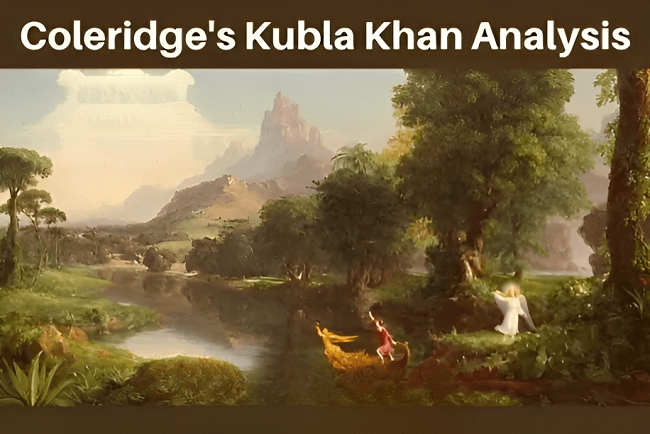
Lasting Impact on the Literary Canon:
- The Romantic movement has benefited greatly from the creation of "Kubla Khan," which is regarded as one of the best poetry ever written.
- Inspiring other Romantic poets to experiment with form and structure, the poem's use of vivid imagery, symbolism, and reference pushed the bounds of appropriate poetry.
- The poem's themes of creativity, nature, and the paranormal have persisted in readers' and writers' hearts over decades, impacting various creative works.
- The poem's transparency, which many critics ascribe to Coleridge's opium addiction, has long-lasting influenced literature, encouraging authors across all genres to experiment with non-traditional narrative forms and delve deeper into human psychology.
- As a keystone of the canon of literature, "Kubla Khan" is still analyzed and praised by academics, students, and readers.
Overall, "Kubla Khan" has had a substantial and long-lasting impact on the canon of literature, inspiring writers and readers to explore themes of imagination, nature, and the paranormal in novel and imaginative ways. Its influence on subsequent Romantic poets' writing and the development of modernist and postmodernist literature is clear. The poem's enduring popularity is proof of both its significance and its rightful place in literary history.
Conclusion:
- A masterwork of Romantic poetry, "Kubla Khan" addresses themes of fantasy, nature, and the paranormal.
- The poem, which Samuel Taylor Coleridge wrote in 1797, is frequently used as a case study for his command of both language and poetic form.
- The poem's structure is intricate and incredibly innovative, with rich symbolism, vivid imagery, and a dreamlike ambience.
- Coleridge pushed the bounds of what was deemed appropriate in poetry by imagery, symbolism, and allusion, which also encouraged other Romantic writers to play about with form and structure.
- Numerous literary works, ranging from the Gothic novels of the 19th century through the modernist poetry of T.S. Eliot and Ezra Pound, show the poem's impact.
- As a keystone of the canon of literature, "Kubla Khan" is still analyzed and praised by academics, students, and readers.
The article thoroughly examines "Kubla Khan," examining its topics, structure, language, historical and cultural background, and its enduring influence on literature and culture. The poem's ongoing appeal is evidence of its importance and confirms its status as one of the greatest pieces of Romantic poetry in literary history.
|





 For Videos Join Our Youtube Channel: Join Now
For Videos Join Our Youtube Channel: Join Now









